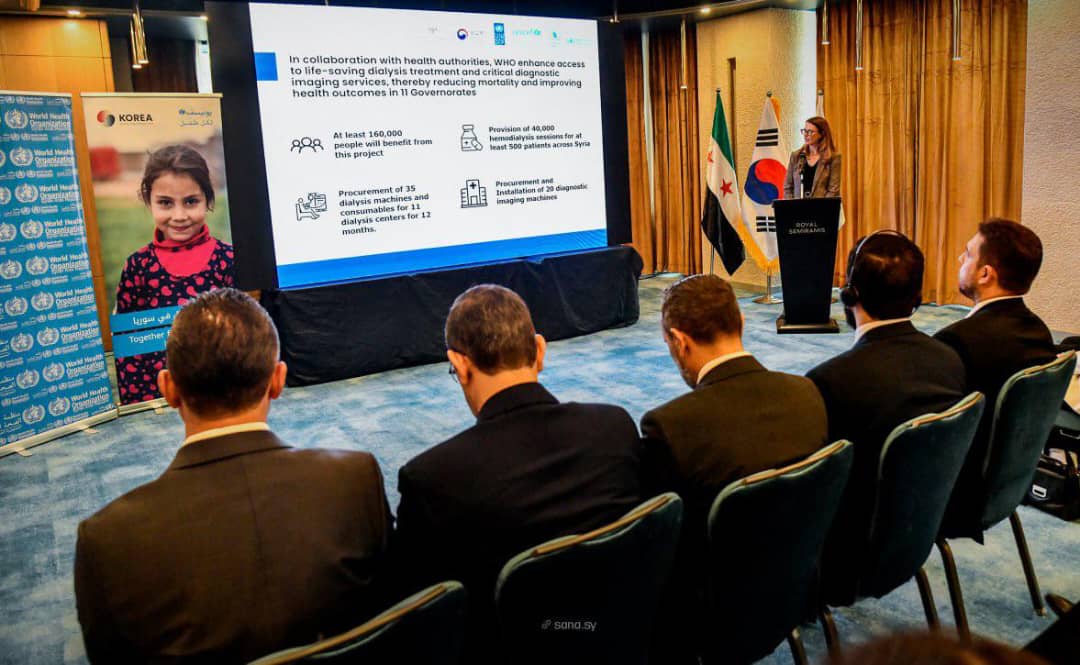South Korea announces a new humanitarian aid package for Syria worth $38 million

The Republic of South Korea announced on Tuesday the funding of a new package of humanitarian projects to support Syria worth $38 million, during an official ceremony held at the "Royal Semiramis" hotel in Damascus, attended by Syrian, Korean, and UN representatives.
These projects will be implemented in partnership with four UN agencies, with $15 million allocated to the United Nations Children's Fund (UNICEF), $10 million to the United Nations Development Programme, $10 million to the World Food Programme, and $3 million to the World Health Organization.
The South Korean ambassador to Lebanon, Gyeosuk Jun, stated: "My government has expressed its desire to provide humanitarian assistance to Syria this year through various UN agencies, and proposals for projects were requested based on the current humanitarian needs within the country, resulting in support for key projects in Syria."
The ambassador added: "Support for medical equipment came through the World Health Organization (WHO) at the direct request of the Syrian Ministry of Health," emphasizing that "the assistance provided is part of efforts to build mutual trust and establish a foundation for bilateral cooperation since the establishment of diplomatic relations between the two countries."
Jun confirmed his country's continued commitment to "maintaining close communication channels with the Syrian government," expressing hope "to deepen areas of cooperation with Syria in the coming years." He affirmed "Korea's readiness as a friend of the Syrian people to continue providing support in the most urgent areas, enabling Syria to move forward on the path to prosperity."
For his part, the Minister of Health, Musab Al-Ali, praised the humanitarian package, considering it "more than just a package of aid; it forms bridges between the international community and Syria." He explained that "the health sector has suffered systematic destruction over the past years due to the practices of the fallen regime, leading to many devices being out of service due to their age, in addition to the direct destruction that affected health facilities."
Al-Ali pointed out that "this reality has reflected on the access of nearly eight million people to basic health services, where they cannot obtain them easily and conveniently, in addition to the ministry still struggling to secure some vital medications such as cancer drugs."
For his part, the Minister of Higher Education and Scientific Research, Marwan Al-Halabi, confirmed "the ministry's deep commitment to cooperating with its partners in the UN and the Republic of Korea to turn these initiatives into a reality that patients and students can feel." He pointed out that "the needs of the university hospitals sector in Syria are significant and urgent, including updating medical equipment, imaging and diagnostic devices, and treatment, developing infrastructure, and ensuring the sustainability of vital services."
For her part, the UNICEF representative in Syria, Merichelle Relanio Arana, described the funding model as "excellent, as it allows donors to provide funds to UN agencies, enabling the implementation of comprehensive packages." She added: "Children need multiple services in health, education, water, and environmental sanitation, and populations need debris removal."
She confirmed that "UNICEF and UN agencies work in coordination with various ministries, where needs in the health and education sectors are discussed at the beginning of each year, after which projects are put into implementation, and then donors are asked to contribute to their funding."
Meanwhile, the Director of the UN Development Programme in Syria, Mohammad Mdwai, pointed out that the grant provided for his program "aims to remove debris and clear war remnants in four governorates: Aleppo, Deir ez-Zor, Homs, and the countryside of Damascus." He explained that "the volume of debris accumulated over the past fourteen years is very large," expecting that "the project will work to remove more than 550,000 cubic meters of debris, which will help facilitate the return of returnees to their residential areas and ensure that their return is safe and sound for all Syrians."
This announcement comes after the signing of the Minister of Foreign Affairs and Expatriates, Asaad Hassan Al-Shaibani, with his Korean counterpart, Cho Tae-yul, on April 10, on an "agreement for diplomatic work to build and enhance friendship and cooperation relations between the two countries, serving the interests of the two friendly peoples," where it was also agreed to "open embassies and exchange diplomatic missions between the two states."